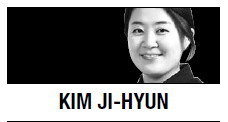[Kim Ji-hyun] What negative rates in Japan mean for Korea
By Sohn Ji-youngPublished : Feb. 10, 2016 - 19:40
 TOKYO — Japanese equities have tumbled, to say the least. The country’s lending rates are below zero, and for the first time the interest rates on long-term government bonds are also negative.
TOKYO — Japanese equities have tumbled, to say the least. The country’s lending rates are below zero, and for the first time the interest rates on long-term government bonds are also negative.On Tuesday, Japan’s stock benchmark Nikkei plunged more than 5 percent. It marked the steepest fall since June 2013.
The results were ironic, since the Jan. 29 move by the Japanese central bank was actually designed to have the opposite effect: boosting stock prices and spur investment.
And usually, that is what lower interest rates do. They drive investors to equities, since lower rates make it easier for listed companies to secure low-interest loans and make new investments.
However, that has yet to happen. Instead, anxious investors are flocking to bonds, driving down yields to the recent unprecedented levels.
Some market experts believe the Bank of Japan has sent out the wrong message by tweaking the interest rate and hinting more easing could come.
“Interest rates (on Japanese bonds) have fallen this far because market participants have excessively factored in additional easing by the BOJ,” Hideo Kumano, chief economist at Dai-ichi Life Research Institute was quoted as saying by the Japan’s biggest economic daily, the Nihon Keizai Shimbun.
While it’s still too early to write off the world’s No. 3 economy, the latest market indices do send chills the back of global investors.
And just when Japan seemed to finally be extricating itself from a lengthy recession.
For Korea, the current situation can have many repercussions.
The first are some of the positive effects. The yen hit its highest point in 15 months as investors flocked to the Japanese currency, which is habitually sought out in times of financial tumult.
Japanese Finance Minister Taro Aso saying the authorities were “observing the markets” was not enough to cap the yen’s rise.
A stronger yen could be blessing for Korea, as a more expensive yen makes South Korean products cheaper abroad in comparison.
A stock downtrend, or the flight of foreign investors, also mean foreigners may come back to South Korean equity markets.
But at the same time, South Korean policies are heavily influenced by Japan due to the large role it plays in the economy.
For instance, the South Korean central bank has now bought some time about the right timing for a rate move. In January, the Bank of Korea kept the key interest rate unchanged.
But with two of its top trader partners — the U.S. and Japan — moving in opposite directions rate-wise, South Korea will eventually be pressed to make a choice.
So far, BOK Gov. Lee Ju-yeol has ruled out the possibility of a rate change, but market watchers say the governor has gained some leverage to hold out for a cut.
South Korean policymakers will have to navigate the waters closely, carefully observing the global economy before making the crucial decision on whether to join the negative rates club or go the opposite way.
Kim Ji-hyun is The Korea Herald's Tokyo correspondent. She can be reached at jemmie@heraldcorp.com. --Ed.








![[Robert J. Fouser] Social attitudes toward language proficiency](http://res.heraldm.com/phpwas/restmb_idxmake.php?idx=644&simg=/content/image/2024/05/16/20240516050799_0.jpg&u=)

![[Graphic News] How much do Korean adults read?](http://res.heraldm.com/phpwas/restmb_idxmake.php?idx=644&simg=/content/image/2024/05/16/20240516050803_0.gif&u=)






![[Herald Interview] Byun Yo-han's 'unlikable' character is result of calculated acting](http://res.heraldm.com/phpwas/restmb_idxmake.php?idx=652&simg=/content/image/2024/05/16/20240516050855_0.jpg&u=)
